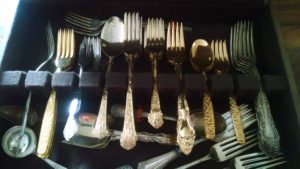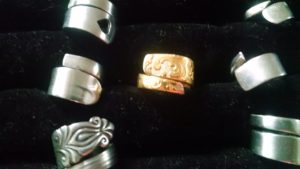Spoon-bending
A long time ago, in a galaxy far, far away . . . Suzi wanted a spoon ring. But, the cost of the precious jewelry was a deterrent to its purchase.
 Then, Angie had an idea. She realized she could make one, even purchase all the tools to make it, at a much lower cost than purchasing it. So, she did.
Then, Angie had an idea. She realized she could make one, even purchase all the tools to make it, at a much lower cost than purchasing it. So, she did.
In fact, she not only made a spoon ring for Suzie, but she made hundreds, maybe thousands, of them for almost anyone who wanted one. And, thus, they grew their business, “Our Twisted Tree,” which includes other items born similarly out of the imagination of both women.
 There are painted wine glasses, wood signs, resin, jewelry, and indoor stained glass windows.
There are painted wine glasses, wood signs, resin, jewelry, and indoor stained glass windows.
“I’m self-taught in the stained glass, and I learned how to do stained glass in books at the local library,” Angie said, “but there’s no welding. I don’t use a welder.”
But, it’s the spoon rings that seem to have caught the eye and imagination of the young people with whom she works through the Family Peer Support Program at the ReHab Center.
“A young man from Franklinville was interested in a ring one of our people had and asked her about it. She told him I made them. He contacted me and asked me to teach him how to make them. He told me his father had tools,” Angie said, adding the next thing she knew she was teaching Spoon-bending.
“It’s been years of playing to learn how to do this,” she said. “Sometimes I find things at garage sales or wherever.”
Angie saw the potential of Spoon-bending as a valuable way to engage teens and parents in a joint activity that was unique and interesting, which also had a positive therapeutic side effect. She applied for a scholarship from the Rehab Center’s Foundation to teach classes in Spoon-bending for the Family Peer Support Program. With the $500 she received, she bought vice grips, mallets, ratchet sets, all the necessary tools for a series of classes on Spoon bending.
“It’s really exciting to see that Foundation dollars resulted in this opportunity,” Elena Bombardier, Director of Development, said. “The Family Peer Support group is a great department, introducing creative projects that offer stress release and produce a beautiful, unique end product!”
Angie and Jamie Canfield, both advocates in the Family Peer Support program, held their first Spoon-bending class at the Linwood Center last week. About eight young people, and their moms, learned the unique art of cutting the head off a spoon, bending and wrapping the stalk into the shape of a ring.
“This is really burning off all my anger,” one girl said, as she pounded the silver head-less spoon with the mallet around a rachet, sized to her finger.
And, that was exactly Angie’s point, her reason for the program. In addition to helping the young learn a craft, they also wiggle out some of their innate adolescent angst.
Angie has opened the classes up to anyone who wants to come and plans to offer them every couple of months.
In the meantime, she needs spoon and fork donations.
If you have a drawer full of old silverware, she would gratefully take them off your hands. You can drop them off to Angie or Jamie at the 3rd Street office or call them at 970-9277 or 970-9283 and they will pick them up. The next Spoon-bending class is coming soon. Stay tuned.
The Rehabilitation Foundation financially assists The Rehabilitation Center’s programs, services and people when there is no other funding available. Click Here to learn more.
